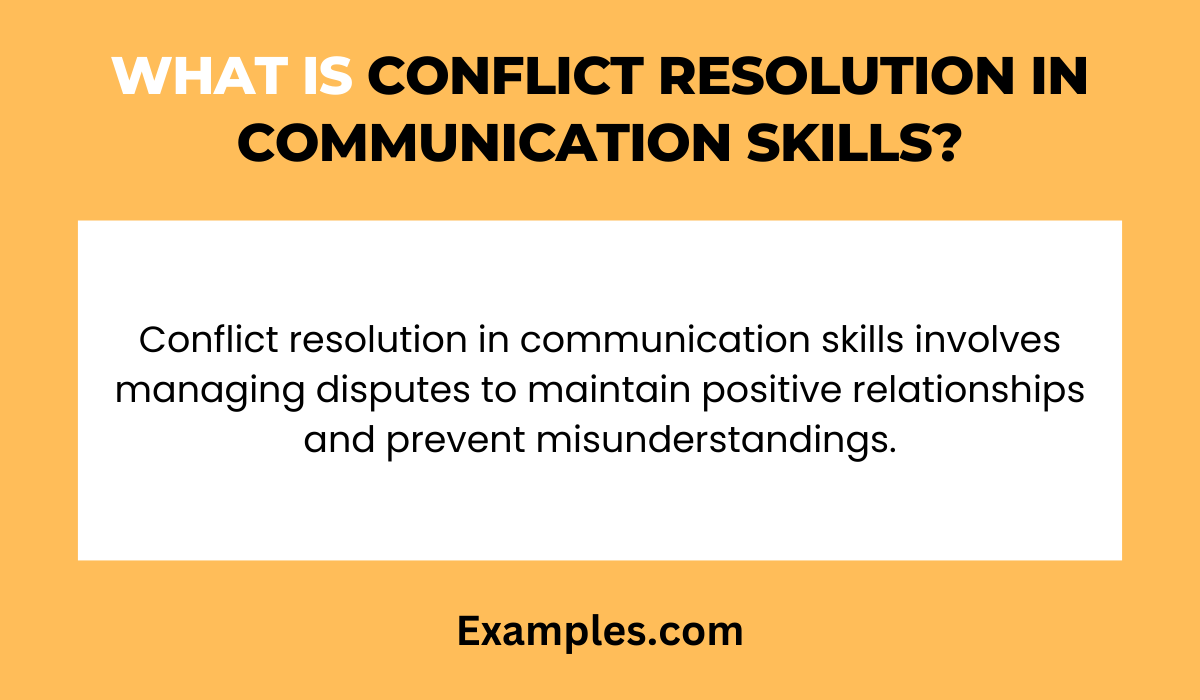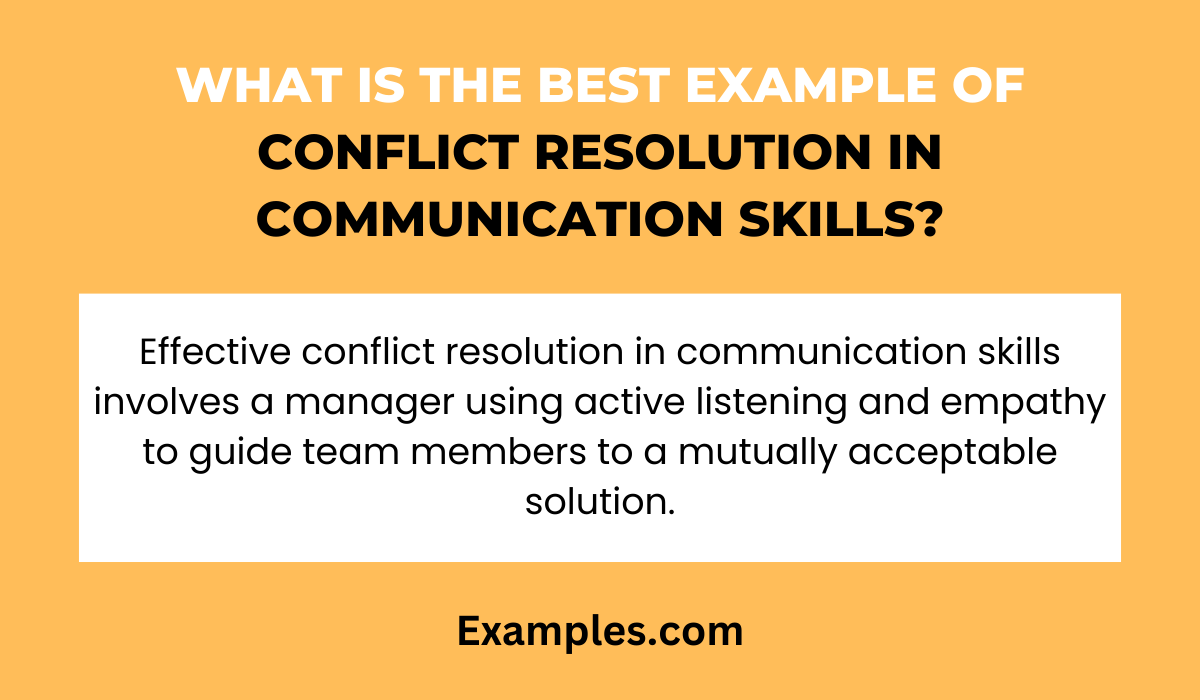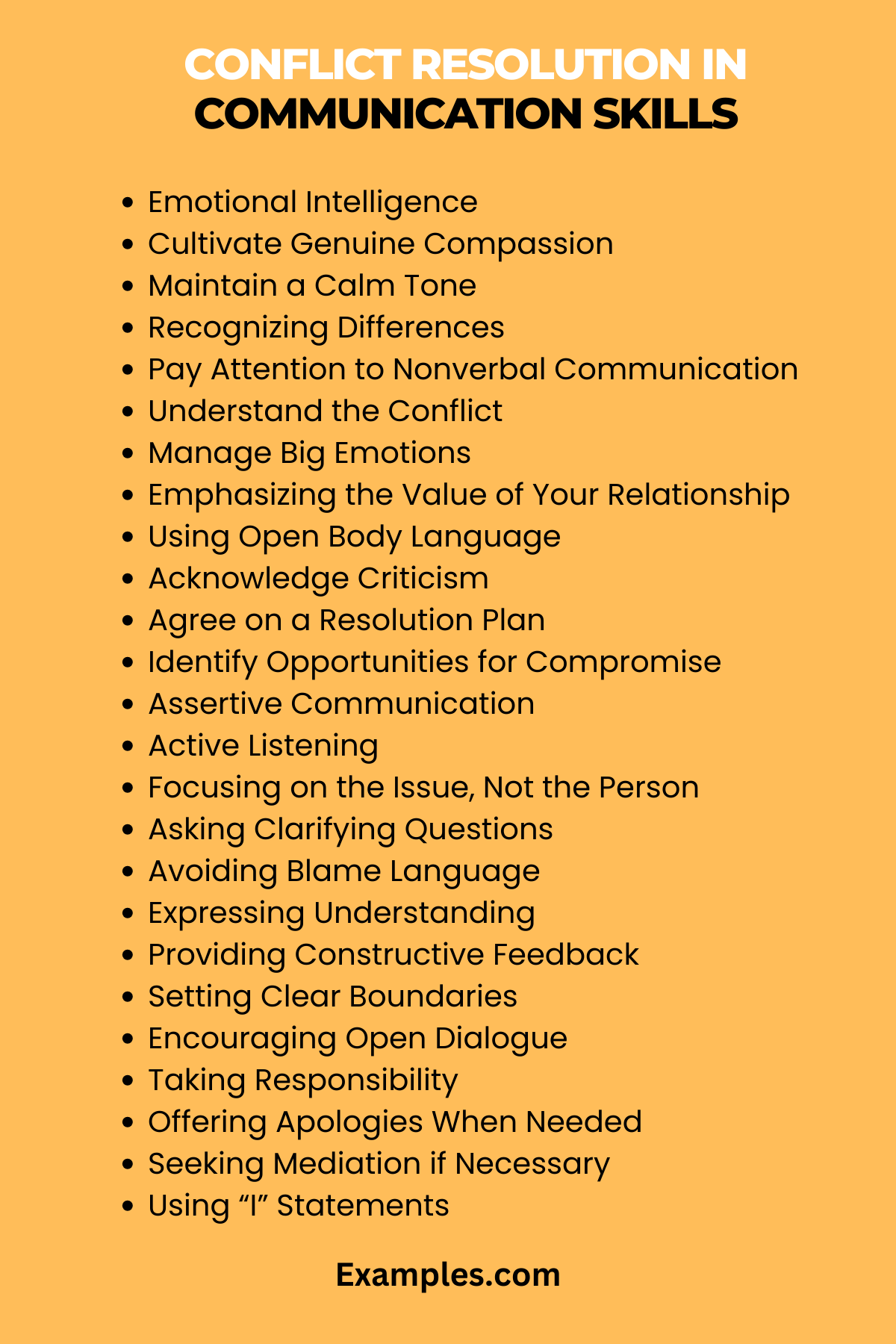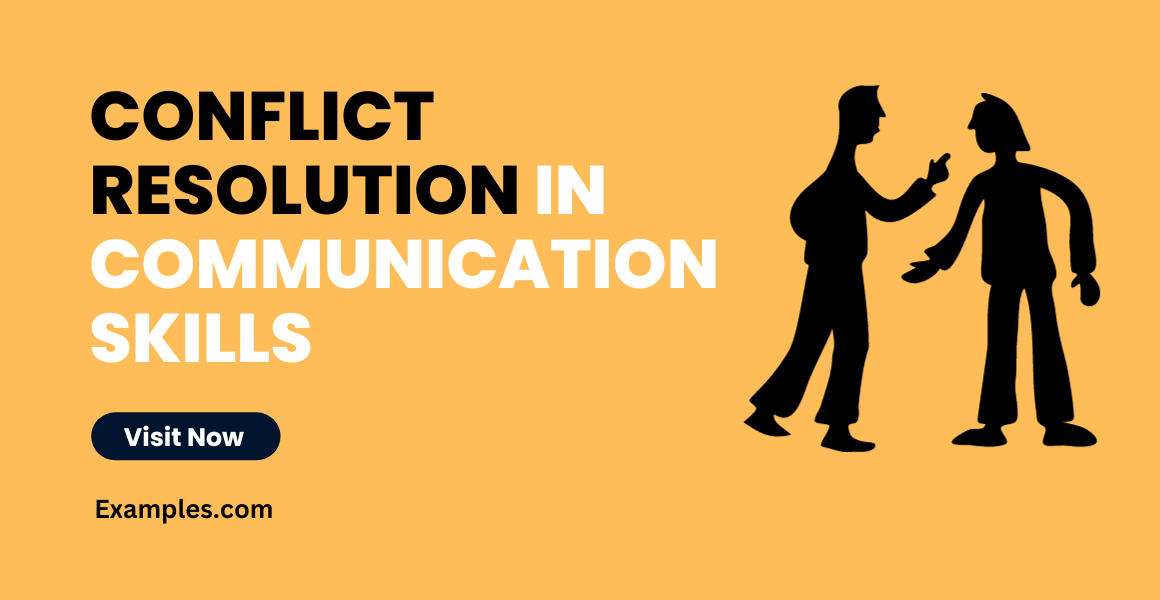29+ Conflict Resolution in Communication Skills Examples
Understanding Conflict Resolution in Communication Skills is essential for maintaining healthy interactions in both personal and professional settings. This guide delves into effective strategies, illustrated with Communication Examples, to resolve disagreements constructively. By mastering these skills, individuals can navigate conflicts with poise and empathy, leading to more productive and harmonious outcomes.
What is Conflict Resolution in Communication Skills?
Conflict resolution in communication skills refers to the methods and approaches used to manage and resolve disputes or disagreements in interpersonal interactions. It’s an integral part of effective communication, helping to maintain positive relationships and prevent misunderstandings.

What is the Best Example of Conflict Resolution in Communication Skills?
A prime example of conflict resolution in communication skills is when a manager mediates a disagreement between team members. By employing active listening and empathy, the manager understands each person’s perspective and guides them towards a mutually acceptable solution.

30 Conflict Resolution in Communication Skills
Mastering Conflict Resolution in Communication Skills involves understanding and applying various techniques to manage and resolve disagreements effectively. This includes leveraging emotional intelligence, maintaining a calm demeanor, recognizing nonverbal cues, and valuing relationships. By doing so, individuals can navigate conflicts with empathy and clarity, leading to more constructive outcomes.

- Emotional Intelligence:
In a heated discussion, pause and reflect on your emotions before responding.
Example: “I realize this topic is important to us both. Let’s discuss this with an open mind.”
- Cultivate Genuine Compassion:
Show empathy towards the other person’s feelings and perspectives.
Example: “I understand your concerns and want to find a way that works for both of us.”
- Maintain a Calm Tone:
Keep your voice steady and soothing during a conflict.
Example: “I hear your points. Let’s work through this together calmly.”
- Recognizing Differences:
Acknowledge and respect the differences in opinions and perspectives.
Example: “We have different views, but I respect your perspective.”
- Pay Attention to Nonverbal Communication:
Observe body language and facial expressions to gauge emotions.
Example: “I notice you seem upset. Can we talk about what’s bothering you?”
- Understand the Conflict:
Aim to clearly understand the root cause of the disagreement.
Example: “Let’s clarify what the main issue is so we can address it directly.”

- Manage Big Emotions:
Control intense emotions to prevent escalation.
Example: “I’m feeling quite passionate about this. Let’s take a moment to cool down.”
- Emphasizing the Value of Your Relationship:
Remind each other of the importance of your relationship.
Example: “Our relationship is more important than this disagreement.”
- Using Open Body Language:
Adopt an open and inviting posture to foster positive communication.
Example: “I’m open to hearing your side. Let’s discuss this openly.”
- Acknowledge Criticism:
Listen and accept constructive criticism without defensiveness.
Example: “I appreciate your feedback. Let’s explore how I can improve.”
- Agree on a Resolution Plan:
Work together to create a plan for resolving the conflict.
Example: “Let’s agree on steps to move forward and resolve this issue.”
- Identify Opportunities for Compromise:
Look for middle ground where both parties can agree.
Example: “Perhaps there’s a compromise that meets both our needs.”
- Assertive Communication:
Communicate your needs and feelings clearly without aggression.
Example: “I feel that my perspective hasn’t been considered. Let’s discuss this.”
- Active Listening:
Listen attentively and respond to the other person’s points.
Example: “I understand what you’re saying. Can you tell me more about your view?”
- Focusing on the Issue, Not the Person:
Keep the discussion centered on the issue rather than personal attacks.
Example: “Let’s focus on the problem at hand, not on personal faults.”
- Asking Clarifying Questions:
Seek to understand by asking questions for clarity.
Example: “Can you explain further so I can understand your point better?”
- Avoiding Blame Language:
Use neutral language that doesn’t assign blame.
Example: “The situation is challenging for both of us. Let’s find a solution.”
- Expressing Understanding:
Show that you understand and validate the other person’s feelings.
Example: “I see why you feel that way. Let’s work on this together.”
- Providing Constructive Feedback:
Offer feedback that is helpful and aimed at resolution.
Example: “Here’s an idea that might address our concerns.”

- Setting Clear Boundaries:
Define what is acceptable behavior and communication.
Example: “I think it’s important we speak respectfully to each other.”
- Encouraging Open Dialogue:
Create an environment where open and honest communication is welcomed.
Example: “Let’s have an open discussion about this, without any judgments.”
- Taking Responsibility:
Own up to your part in the conflict.
Example: “I acknowledge my role in this, and I want to make it right.”
- Offering Apologies When Needed:
Apologize sincerely if you have contributed to the conflict.
Example: “I’m sorry for my part in this misunderstanding. Let’s move forward.”
- Seeking Mediation if Necessary:
Consider involving a neutral third party for resolution.
Example: “Maybe we should seek some external advice to help us resolve this.”
- Using “I” Statements:
Express your feelings and thoughts using “I” instead of “You”.
Example: “I feel unheard when my ideas are not considered.”
- Demonstrating Patience:
Be patient and give the process of resolution time.
Example: “Let’s take our time to sort this out properly.”
- Respecting Silence:
Allow moments of silence for reflection and calming.
Example: “Let’s pause for a moment and think about this.”
- Revisiting Agreements:
Review and revisit agreements to ensure they are upheld.
Example: “Let’s check back on our agreement next week to see how we’re doing.”
- Celebrating Resolutions:
Acknowledge and celebrate when a resolution is reached.
Example: “We’ve worked through this well. I’m glad we found a solution.”
- Continuous Improvement:
Always look for ways to improve communication and conflict resolution skills.
Example: “Let’s keep learning and improving how we handle conflicts.”
What is the Role of Communication in Conflict Resolution?
Understanding the role of communication in conflict resolution is crucial for effective interpersonal interactions. This exploration reveals how communication acts as a bridge between differing viewpoints, facilitating understanding and resolution. Effective conflict management hinges on the ability to communicate clearly and empathetically, highlighting the indispensability of Communication Skills in resolving disputes.
- Facilitates Understanding: Effective communication is key to understanding different perspectives, a critical aspect in resolving conflicts.
- Promotes Clarity: Clear communication helps avoid misunderstandings that often escalate conflicts.
- Encourages Empathy: Through communication, parties can express and recognize emotions, fostering empathy.
- Enables Problem-Solving: Open communication allows for collaborative problem-solving, essential in conflict resolution.
- Builds Trust: Honest and transparent communication builds trust, a cornerstone of conflict resolution.
- Supports Active Listening: Communication isn’t just about speaking; active listening is vital for understanding the root of conflicts.
- Aids in Negotiation: Effective communication skills are crucial for negotiation, a key element in conflict resolution.
- Allows for Feedback: Communication provides a platform for feedback, helping parties understand each other’s viewpoints.
- Encourages Positive Interactions: Respectful communication fosters a positive atmosphere, conducive to resolving conflicts.
- Supports Non-Verbal Cues: Effective communication includes understanding non-verbal signals, which are important in gauging emotions during conflicts.
Importance of Conflict Resolution in Communication Skills?
The importance of conflict resolution in communication skills cannot be overstated. It is a fundamental aspect that determines the efficacy of interactions in both personal and professional spheres. By honing these skills, individuals can navigate through disagreements with poise, ensuring that conflicts become opportunities for growth rather than obstacles, thereby underscoring the importance of communication skills in every aspect of life.
- Improves Relationships: Good conflict resolution strengthens relationships, both personal and professional.
- Enhances Team Productivity: In workplaces, effective conflict resolution boosts team morale and productivity.
- Reduces Stress: Successfully resolving conflicts reduces stress and anxiety associated with unresolved issues.
- Promotes a Healthy Work Environment: Conflict resolution contributes to a positive and healthy work environment.
- Encourages Personal Growth: Learning to resolve conflicts effectively aids in personal development.
- Prevents Escalation: Effective conflict resolution prevents minor disagreements from escalating into major issues.
- Improves Decision Making: Clear communication and conflict resolution lead to better decision-making processes.
- Boosts Confidence: Successfully navigating conflicts boosts individuals’ confidence in their communication skills.
- Fosters Innovation: Resolved conflicts can lead to new ideas and innovation, especially in a team setting.
- Ensures Long-term Success: Conflict resolution is key for the long-term success and sustainability of relationships and organizations.
Benefits of Communication in Conflict Resolution
Delving into the benefits of communication in conflict resolution unveils a multitude of positive outcomes. Effective communication not only resolves conflicts but also strengthens relationships, enhances mutual understanding, and promotes a more harmonious environment. These benefits underscore why robust communication skills are essential tools for managing and resolving conflicts in any setting.
- Creates Mutual Understanding: Effective communication leads to mutual understanding, pivotal in resolving conflicts.
- Fosters Quick Resolution: Clear communication can lead to quicker conflict resolution.
- Reduces Misinterpretations: Good communication skills help in reducing misinterpretations and assumptions.
- Improves Collaboration: Communication fosters collaboration, essential in finding common ground during conflicts.
- Builds Emotional Intelligence: Regular practice in conflict resolution enhances emotional intelligence.
- Promotes Respect: Effective communication in conflict resolution promotes respect among the conflicting parties.
- Encourages Transparency: Transparency in communication is vital for resolving conflicts effectively.
- Strengthens Bonds: Conflicts, when resolved through effective communication, can strengthen interpersonal bonds.
- Cultivates a Learning Environment: Conflict resolution provides learning opportunities for better communication.
- Improves Overall Well-being: Resolving conflicts effectively contributes to the overall well-being of individuals and teams.
Tips for Conflict Resolution in Communication Skills
Mastering conflict resolution in communication skills requires more than just understanding; it demands practical application. This section provides valuable tips that can transform the way conflicts are handled. From practicing active listening to expressing oneself clearly, these tips are designed to enhance your communication skills, making conflict resolution a more manageable and constructive process.
- Practice Active Listening: Ensure you understand the other party’s perspective before responding.
- Stay Calm: Maintain composure to communicate more effectively during conflicts.
- Use “I” Statements: Express your feelings without blaming the other party.
- Seek to Understand, Then to Be Understood: Focus on understanding the other’s viewpoint before making your point.
- Keep Non-Verbal Communication Positive: Be mindful of body language and facial expressions.
- Find Common Ground: Look for areas of agreement to build upon.
- Avoid Escalating Language: Steer clear of words that might escalate the conflict.
- Be Clear and Concise: Avoid misunderstandings by being clear in your communication.
- Focus on the Issue, Not the Person: Keep the conversation focused on resolving the issue.
- Agree to Disagree: Sometimes, agreeing to disagree can be a healthy way to resolve a conflict.
Effective communication is the backbone of conflict resolution. By mastering communication skills like active listening, empathy, and clear articulation, individuals and teams can resolve conflicts efficiently, fostering healthier relationships and productive environments. Remember, conflict resolution is not just about solving problems, but also about building stronger, more understanding connections.



